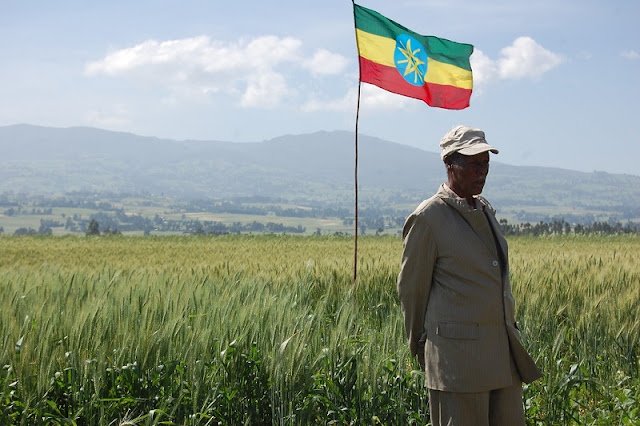By Andrew Korybko
Ethiopian Prime Minister Abiy Ahmed's pragmatic remarks in late October about reducing his country's wheat imports were maliciously misreported by some foreign media. The UK's Telegraph falsely headlined an article at the time titled “Ethiopian PM Threatens To Stop Food Aid Entering The Country”, which propagated the weaponized information warfare narrative that he's personally carrying out a so-called “genocide” in the terrorist-controlled northern Tigray Region that's presently occupied by the TPLF.
To their credit, the BBC was more balanced in their piece about this at the end of the month titled “Ethiopia Food Crisis: Why Does PM Have A Problem With Wheat Aid?”. That outlet accurately reported on his words warning about the risk of importing agricultural diseases from such aid as well as his spokeswoman's clarification about him “talking more generally about the need to move away from wheat and towards healthier local produce.” Nevertheless, their dramatic description of this as a “crisis” contributes to fearmongering.
What's happening is that foreign forces aim to instrumentalize this issue so as to manufacture doubts among the international community about Ethiopia's commitment to ensuring food security for its people, especially those in Tigray. This is intended to advance the “genocide” narrative that's meant to maximize foreign pressure on its government in an attempt to coerce it into unilateral political concessions. Particularly, the plan seems to be comprehensively erode the country's sovereignty by making it more dependent on others in all respects.
To elaborate, even the comparatively more balanced BBC tried to sow the seeds of doubt in their piece by writing that PM Abiy's spokeswoman's response “doesn't explain why the government only has an issue with imported wheat and not the locally produced crop, which provides three-quarters of the country's overall supply.” According to the outlet, locally produced crops might also spread certain diseases, so they're implying that Ethiopia has ulterior motives in sharing its explanation. This might fuel the “genocide” conspiracy theory.
In reality, not only is no so-called “genocide” occurring in the Tigray Region - and if anything, ethnic cleansing and disturbing signs of a genuine genocide are evidenced through the TPLF's indiscriminate killings of non-ethnic-Tigrayans in the Afar and Amhara Regions that they invaded over the summer - but Ethiopia isn't weaponizing its wheat. To the contrary, it ambitiously aspires to become more agriculturally self-sufficient in order to reduce its dependence on such imports that hostile foreign forces could weaponize against it.
Despite its representatives' regular rhetoric to the contrary, the West is actually opposed to Global South nations like Ethiopia ever sustainably ensuring food security. One underdiscussed aspect of the American Hybrid War on Ethiopia is how it politicizes agricultural issues - in this case food aid - as part of its increasingly intensifying information war against that country. Not only does it understand how emotive this issue is for the international audience in terms of shaping their perceptions, but it also knows its importance inside Ethiopia.
The BBC's report notes that the country imports a quarter of its wheat, approximately a quarter of which (so around 6% of its total) it receives as food aid, mostly from the US. Although this ratio might not seem too significant, it can still have a powerful impact on domestic stability during the ongoing conflict if it's instrumentalized to put further pressure on the government. This agricultural aspect of the American Hybrid War on Ethiopia is also inextricably connected to the economic war against it.
As Ethiopia attempts to reduce its dependence on foreign food aid, it must first seriously consider switching suppliers in order to not remain as vulnerable to the West's possible weaponization of this aid during the interim. Russia has become an agricultural superpower in recent years, ironically enough largely due to its response to Western sanctions according to President Putin during his remarks at the latest Valdai Club plenary session. It should therefore have more than enough supply to meet Ethiopia's needs.
The Eurasian Great Power is incomparably more politically reliable than the West as evidenced by its support of Ethiopia during its ongoing anti-terrorist campaign in Tigray. The two countries even signed a military agreement over the summer which aims to revive their Soviet-era strategic partnership. From the Ethiopian perspective, it would be wise to rely more on Russian wheat imports - including through possible food aid - than on Western ones while it transitions towards sustainably ensuring its food security, which will take time.
Altogether, PM Abiy's comments about wheat shouldn't be politicized, but praised. He deserves to be applauded for his ambitious vision of reducing Ethiopia's dependence on foreign imports. Precisely because this is against Western interests, especially in the context of the American Hybrid War on Ethiopia, the issue is being politicized so as to manipulate foreign perceptions of him and his government. Be that as it may, the reality is that Ethiopia is becoming more sovereign under his leadership, which can inspire other African countries.

Comments
Post a Comment